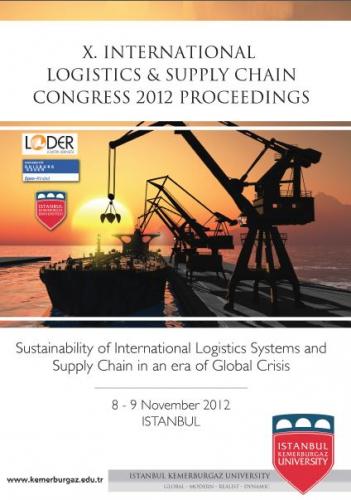10. Lojistik ve Tedarik Zinciri Kongresi 2012 Bildiri Kitabı (İngilizce)X. International Logıstic & Supply Chain Congress 2012 Proceedings
Global business world is trying to adapt the new dynamics of the era of global crisis and deal with the issues related to the sustainability of logistics systems as well as international supply chains. While the structure of international trade is changing, we are witnessing increasing share of the emerging markets in the global trade. The uncertainties and risks within the developed economies especially EU are adversely affecting the global trade and this reality is causing even more pressure on international logistics. In this new environment, businesses need to find innovative ways to improve performances, mitigate risks, decrease associated costs and increase productivity. Universities on the other hand, need to support businesses by both educating competent and qualified graduates as well as expanding research horizons. However, the crucial dilemma is to lessen the mistrust and distance between universities and businesses. We can deal with the challenges of the global crises era, if and only if we can succeed the joint initiatives between universities and businesses. We are hoping that the congresses like this one will help to improve joint projects of theory and practice.
In order to support this goal, the practical needs and problems with respect to logistics and supply chain management are discussed in the first day of the congress mainly by the professionals. In the opening speeches; Prof. Dr.-Ing. Bernd Noche defined the methods of logistics engineering for designing sustainable supply chains, Zeynep Keskin, Managing Director of SAP Turkey, discussed visionary approaches in the ERP world with respect to logistics and supply chain management issues. In the practitioners panels while CEOs of the leading shipping companies are discussing the causes and results of the crises, CPOs of the leading companies define the increasing importance of procurement as a profit multiplier. In the second day of the congress, academicians present their analysis, findings and suggestions regarding the issues of the practical world from the academic perspectives.

Global business world is trying to adapt the new dynamics of the era of global crisis and deal with the issues related to the sustainability of logistics systems as well as international supply chains. While the structure of international trade is changing, we are witnessing increasing share of the emerging markets in the global trade. The uncertainties and risks within the developed economies especially EU are adversely affecting the global trade and this reality is causing even more pressure on international logistics. In this new environment, businesses need to find innovative ways to improve performances, mitigate risks, decrease associated costs and increase productivity. Universities on the other hand, need to support businesses by both educating competent and qualified graduates as well as expanding research horizons. However, the crucial dilemma is to lessen the mistrust and distance between universities and businesses. We can deal with the challenges of the global crises era, if and only if we can succeed the joint initiatives between universities and businesses. We are hoping that the congresses like this one will help to improve joint projects of theory and practice.
In order to support this goal, the practical needs and problems with respect to logistics and supply chain management are discussed in the first day of the congress mainly by the professionals. In the opening speeches; Prof. Dr.-Ing. Bernd Noche defined the methods of logistics engineering for designing sustainable supply chains, Zeynep Keskin, Managing Director of SAP Turkey, discussed visionary approaches in the ERP world with respect to logistics and supply chain management issues. In the practitioners panels while CEOs of the leading shipping companies are discussing the causes and results of the crises, CPOs of the leading companies define the increasing importance of procurement as a profit multiplier. In the second day of the congress, academicians present their analysis, findings and suggestions regarding the issues of the practical world from the academic perspectives.
